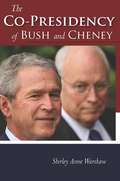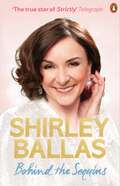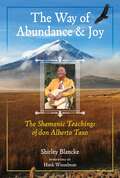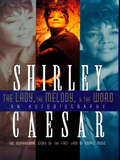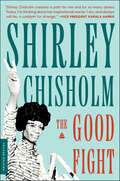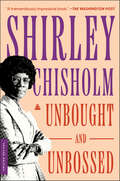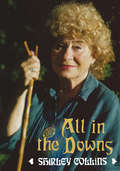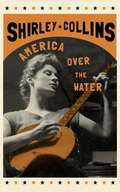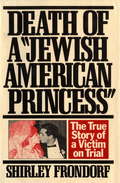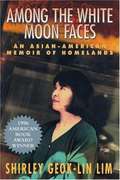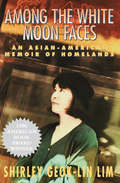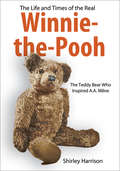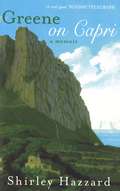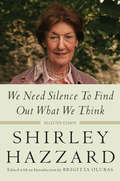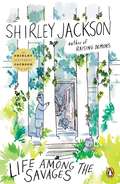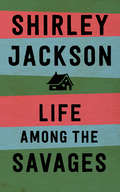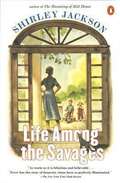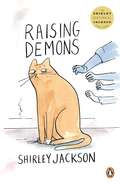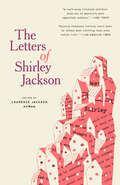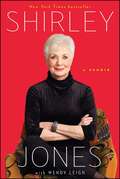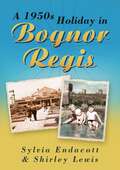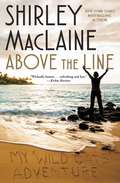- Table View
- List View
The Co-Presidency of Bush and Cheney
by Shirley Anne WarshawThe Bush administration is out but the American public continues to suffer from its disastrous domestic and foreign policies. In this excellently documented work, presidential scholar Shirley Anne Warshaw offers an in-depth analysis and exploration of the political maneuvering that got us into our current mess. Combining her study of the motivations of both Dick Cheney and George W. Bush, knowledge of the spheres in which they operated, and personal interviews with White House staff and Washington insiders, Warshaw demonstrates that these complementary conservatives were nothing less than co-presidents. Breaking with popular sentiment, she denies that Bush's authority was hijacked or stolen. Bush, rather, focused on building what he called a moral and civil society, anchored by a war on science and by the proliferation of faith-based programs, while allowing Cheney to lead in business and foreign policy. Warshaw highlights Cheney's decades-long career in Washington and his familiarity with its inner workings to present a complete picture of this calculating political powerhouse who continues to capture headlines. From Cheney's unprecedented merging of the vice president's office into the president's to his abhorrence of what he deemed congressional interference in the president's ability to do his job, Warshaw paints an intriguing, and at times frightening, portrait.
Behind the Sequins: My Life
by Shirley BallasLeave it all on the floor...Queen of Latin Ballroom, Shirley Ballas has a spectacular dance career spanning over 40 years – she has Cha-Cha'd her way across the world's dance floors to become a multi-award-winning ballroom champion and one of the most renowned dancers in the world. In 1996, Shirley retired from competitive dancing to become a highly-acclaimed coach and now holds the enviable position of Head Judge on BBC One's prime time show Strictly Come Dancing.In Behind the Sequins, she leads us through her dramatic and determined life, from growing up in a rough estate on the Wirral and leaving home at 14 years old, to conquering the high-octane world of ballroom and coping with betrayal, bullying, two broken marriages and a personal tragedy that left Shirley and her family devastated. Speaking from the heart, Shirley leaves her dancing shoes at the door to tell you the story of a fiery, strong-willed grafter who could make the brat pack blush.
The Way of Abundance and Joy: The Shamanic Teachings of don Alberto Taxo
by Shirley Blancke• Shows how to relate to and receive help from the elements, reconnect with nature to access abundance and joy, connect with plants, animals, water, air, and fire • Explores don Alberto&’s upbringing in a family of yachaks, his initiation, and his personal work to fulfill the Andean prophecy of the Eagle and the Condor • Includes reflections and essays from several of don Alberto&’s students and others who have worked with him, including Itzhak Beery and John Perkins Recognized as a master yachak, don Alberto Taxo is a celebrated spiritual elder, shaman, and healer of the pre-Inca Atik (Kichwa) people from the Andes Mountains of Ecuador. He has been sharing ancient Andean shamanic wisdom and practices in the United States for more than 20 years--his personal quest to fulfill the Andean prophecy that the Eagle and the Condor will fly together in the same sky in harmony. Written with don Alberto&’s permission and as further fulfillment of the Eagle-Condor prophecy, this book shares don Alberto&’s teachings and his simple approaches for building a reciprocal relationship with nature, centered on Sumak Kausay, the way of joy and abundance. As a yachak, a shaman of the elements, don Alberto shows how to relate to and receive help from nature. When we are connected with nature on an emotional and spiritual level it creates joy that is deeply healing and can be accessed during life&’s difficulties. The book discusses traditional Ecuadorian shamanic beliefs and practices, including Andean Inca cosmology; how to connect with plants, animals, air, fire, and water in sacred springs, the ocean, or your shower; and Inca concepts like Pacha, the space-time era in which we live that is now transitioning to a new one of connection and love after 500 years. The book explores don Alberto&’s upbringing in a family of yachaks, his initiation, and his assumption of the role of shaman for his community. It also includes reflections and essays from don Alberto&’s students and others who have worked with him, including shamanic teachers Itzhak Beery and John Perkins, showing how he influenced their lives and awakened them to the path of Sumak Kausay, Abundant Life.
The Lady, The Melody, and the Word
by Shirley CaesarShirley describes her family, and their early struggles, the trials and tribulations she went through during the Civil Rights movement, her early singing career, and her callilng to become a pastor and concert performer. With a combination of music, ministry, and the message in all of her performances, all who hear her know that she listens to God every step of the way. Shirley introduces each chapter of The Lady, the Melody, and the Word with just that: the melody (lyrics to her inspiring songs) and the word (Scriptures that have inspired her), and along the way she will introduce you to her own inspiring story.
The Good Fight
by Shirley ChisholmThe revered civil rights activist and pioneering member of Congress chronicles her groundbreaking 1972 run for President as the first woman and person of color—a work of immense historical importance that both captures and transcends its times, newly reissued to commemorate the fiftieth anniversary of her campaign.“Shirley Chisholm's fearless determination has been an inspiration to so many of us.” —Regina KingBefore Kamala Harris, before Hillary Rodham Clinton there was Shirley Chisholm. In 1972, the Congresswoman from New York—the first Black woman elected to Congress—made history again when she announced her candidacy for President of the United States. Though she understood victory was a longshot, Chisholm chose to run “because someone had to do it first. . . . I ran because most people think the country is not ready for a black candidate, not ready for a woman candidate.” In this invaluable political memoir, Chisholm reflects on her unique campaign and a nation at the crossroads of change. With the striking candor and straightforward style for which she was famous, Chisholm reveals the essential wheeling and dealing inherent to campaigning, castigates the innate conservatism and piety of the Black majority of the period, decries identity politics that lead to destructive power struggles within a fractious Democratic Party, and offers prescient advice on the direction of Black politics. From the whirlwind of the primaries to the final dramatic maneuvering at the tumultuous 1972 Democratic National Convention, The Good Fight is an invaluable portrait of twentieth-century politics and a Democratic Party in flux.Most importantly, The Good Fight is the portrait of a reformer who dedicated her life to making politics work for all Americans. Chisholm saw her campaign as an extension of her political commitment; she ran as an idealist grounded in reality who used her opportunity and position to give voice to all the forgotten. This book bears the stamp of her remarkable personality and her commitment to speaking truth no matter the consequences.Look out for the biopic Shirley, directed by John Ridley and starring Regina King, coming in March 2024.
Unbought and Unbossed
by Shirley ChisholmIn this classic work—a blend of memoir, social criticism, and political analysis that remains relevant today—the first Black Congresswoman to serve in American history, New York’s dynamic representative Shirley Chisholm, traces her extensive political struggle and examines the problems that have long plagued the American system of government.“A tremendously impressive book.” —Washington Post“What [Chisholm] did was so pioneering. . . . She embraced what made her different and used it as her superpower.” —Regina King“I want to be remembered as a woman . . . who dared to be a catalyst of change.” Political pioneer Shirley Chisholm—activist, member of the House of Representatives, and former presidential candidate—was a woman who consistently broke barriers and inspired generations of American women, and especially women of color. Unbought and Unbossed is her story, told in her own words—a thoughtful and informed look at her rise from the streets of Brooklyn to the halls of Congress. Chisholm speaks out on her life in politics while illuminating the events, personalities, and issues of her time, including the schism in the Democratic party in the 1960s and ’70s—all of which speak to us today.In this frank assessment, “Fighting Shirley” recalls how she took on an entrenched system, gave a public voice to millions, and embarked on a trailblazing bid to be the first woman and first African American President of the United States. By daring to be herself, Shirley Chisholm shows how one person forever changed the status quo.Look out for the biopic Shirley, directed by John Ridley and starring Regina King, coming in March 2024.“Her motto and title of her autobiography—Unbought and Unbossed—illustrates her outspoken advocacy for women and minorities during her seven terms in the U.S. House of Representatives.” —National Women’s History Museum
All in the Downs: Reflections on Life, Landscape, and Song (Strange Attractor Press Ser.)
by Shirley CollinsA memoir from one of Britain's legendary singers, folklorists, and music historians.A legendary singer, folklorist, and music historian, Shirley Collins has been an integral part of the folk-music revival for more than sixty years. In her new memoir, All in the Downs, Collins tells the story of that lifelong relationship with English folksong—a dedication to artistic integrity that has guided her through the triumphs and tragedies of her life. All in the Downs combines elements of memoir—from her working-class origins in wartime Hastings to the bright lights of the 1950s folk revival in London—alongside reflections on the role traditional music and the English landscape have played in shaping her vision. From formative field recordings made with Alan Lomax in the United States to the &“crowning glories&” recorded with her sister Dolly on the Sussex Downs, she writes of the obstacles that led to her withdrawal from the spotlight and the redemption of a new artistic flourishing that continues today with her unexpected return to recording in 2016. Through it all, Shirley Collins has been guided and supported by three vital and inseparable loves: traditional English song, the people and landscape of her native Sussex, and an unwavering sense of artistic integrity. All in the Downs pays tribute to these passions, and in doing so, illustrates a way of life as old as England, that has all but vanished from this land.Generously illustrated with rare archival material.
America Over the Water
by Shirley Collins'Shirley is a time traveller, a conduit for essential human aches, one of the greatest artists who ever lived' Stewart Lee'Without doubt one of England's greatest cultural treasures' Billy BraggIn America Over the Water, celebrated English folksinger Shirley Collins offers an affecting account of her year-long stint as assistant to legendary musical historian and folklorist Alan Lomax. Together, they travelled to Virginia, Kentucky, Alabama, Mississippi, Arkansas, and Georgia, encountering Mississippi Fred McDowell, Muddy Waters and many others, in their tireless work to uncover the traditional music of America's heartland. Blending the personal story of Shirley Collins' relationship with Lomax and offering a unique first-hand account of a country on the brink of the civil rights era, America Over the Water cuts right to the heart of the blues in a fascinating account of Collins' and Lomax's ground-breaking journey across the southern states of the USA to record the music that started it all. Originally published over fifteen years ago, this definitive edition includes a new introduction by Shirley Collins.
America Over the Water
by Shirley Collins'Shirley is a time traveller, a conduit for essential human aches, one of the greatest artists who ever lived' Stewart Lee'Without doubt one of England's greatest cultural treasures' Billy BraggIn America Over the Water, celebrated English folksinger Shirley Collins offers an affecting account of her year-long stint as assistant to legendary musical historian and folklorist Alan Lomax. Together, they travelled to Virginia, Kentucky, Alabama, Mississippi, Arkansas and Georgia, discovering Mississippi Fred McDowell and many others, in their tireless work to uncover the traditional music of America's heartland. Blending the personal story of Shirley Collins' relationship with Lomax and offering a unique first-hand account of a country on the brink of the civil rights era, America Over the Water cuts right to the heart of the blues in a fascinating account of Collins' and Lomax's ground-breaking journey across the southern states of the USA to record the music that started it all. Originally published over fifteen years ago, this definitive edition includes a new introduction by Shirley Collins.
America Over the Water
by Shirley CollinsIn America Over the Water, celebrated English folksinger Shirley Collins offers an affecting account of her year-long stint as assistant to legendary musical historian and folklorist Alan Lomax. Together, they travelled to Virginia, Kentucky, Alabama, Mississippi, Arkansas and Georgia, discovering Mississippi Fred McDowell and many others, in their tireless work to uncover the traditional music of America's heartland. Blending the personal story of Shirley Collins' relationship with Lomax and offering a unique first-hand account of a country on the brink of the civil rights era, America Over the Water cuts right to the heart of the blues in a fascinating account of Collins' and Lomax's ground-breaking journey across the southern states of the USA to record the music that started it all. Originally published over fifteen years ago, this definitive edition includes a new introduction by Shirley Collins.
Death of a Jewish American Princess
by Shirley FrondorfIn 1982, a sensational murder trial in Phoenix, Arizona, reverberated throughout the legal community. Restaurateur Steven Steinberg, who killed his wife by stabbing her 26 times, was acquitted; his legal defense portrayed the victim as an overpowering "Jewish American Princess" whose excesses may have provoked her violent end. Examining the structure of the defense's case, Frondorf, an attorney who was previously a psychiatric social worker, follows the theme that made Elana Steinberg the villain, instead of the victim, of the piece. The defense's forensic presentation, bolstered by testimony from psychiatrists, maintained that Steinberg committed the crime while sleepwalking, an abnormality allegedly brought on by the intemperate spending of his wife. Frondorf recreates the trial whose outcome scarred the tightly knit Jewish community of Phoenix.
Among the White Moon Faces: An Asian-American Memoir of Homelands
by Shirley G. LimPoet Lim's memoir describes her childhood in Malaysia, the post- colonial days of her university youth, and her eventual migration to the United States. In this cultural document of both the US and Malaysia, her poetic mastery makes the tale vivid by its evocative language and attention to emotional detail, somewhat mitigating the often characteristic triteness of immigrant stories, particularly ones like this that rely heavily on feminist and psychological ideologies.
Among the White Moon Faces: An Asian-American Memoir of Homelands (The\cross-cultural Memoir Ser.)
by Shirley Geok-lin LimThis &“fascinating autobiography&” from an award-winning Asian-American female author &“reads like a novel&” (The Washington Post Book World). With insight, candor, and grace, Shirley Geok-lin Lim recalls her path from her poverty-stricken childhood in war-torn Malaysia to her new and exciting yet uncertain womanhood in America. Grappling to secure a place for herself in the United States, she is often caught between the stifling traditions of the old world and the harsh challenges of the new. But throughout her journey, she is sustained by her &“warrior&” spirit, gradually overcoming her sense of alienation to find a new identity as an Asian American woman: professor, wife, mother, and, above all, an impassioned writer. In Among the White Moon Faces, Lim offers a memorable rendering of immigrant women&’s experience and a reflection upon the homelands we leave behind, the homelands we discover, and the homelands we hold within ourselves. &“What sets Among the White Moon Faces apart is that Lim writes with such aching precision, revealing and insightfully analyzing her changing roles as woman, immigrant, scholar, and Other.&” —San Francisco Chronicle Book Review &“Lim&’s descriptions are both lyrical and precise.&” —Publishers Weekly &“Evocative writing bolstered by insights into colonialism, race relations, and the concept of the &‘other&’. . . . This is an entrancing memoir.&” —Kirkus Reviews
The Life and Times of the Real Winnie-the-Pooh: The Teddy Bear Who Inspired A.A.Milne
by Shirley HarrisonThe true story of the iconic teddy bear who became a beloved children’s book character and continues to inspire children around the world. In this captivating biography, author Shirley Harrison follows the journey of Winnie-the-Pooh, the world’s most famous silly old bear, from his first appearance to his final resting place. Winnie-the-Pooh was “born” in an Acton toy factory in 1921. From there he traveled to Harrods where he was bought by Mrs. Daphne Milne for her baby son, Christopher Robin. At the family’s farmhouse in Ashdown Forest, Sussex, deep in the “Hundred Acre Wood,” author A.A. Milne transformed his son Christopher Robin’s playtime fantasies into the stories that would captivate readers the world over. From England, Pooh emigrated to America, spending many years as a celebrity on tour. Today, he lives in retirement in the Children’s Center of the New York Public Library along with Tigger, Eeyore, Kanga, and Piglet. Filled with family anecdotes and illustrated with photographs of the people and places that brought the bear to life, The Life and Times of the Real Winnie-the-Pooh is a biography that traces the steps of the bear himself, the Milne family, and the loveable character they created.
Greene On Capri: A Memoir
by Shirley HazzardWhen friends die, one's own credentials change: one becomes a survivor. Graham Greene has already had biographers, one of whom has served him mightily. Yet I hope that there is room for the remembrance of a friend who knew him - not wisely, perhaps, but fairly well - on an island that was ''not his kind of place,'' but where he came season after season, year after year & where he, too, will be subsumed into the capacious story.'For millennia the cliffs of Capri have sheltered pleasure-seekers & refugees alike, among them the emperors Augustus & Tiberius, Henry James, Rilke & Lenin, plus hosts of artists, eccentrics & outcasts. Here in the 1960s Graham Greene became friends with Shirley Hazzard & her husband, the writer Francis Steegmuller; their friendship lasted until Greene's death in 1991. In GREENE ON CAPRI, Hazzard uses their ever volatile intimacy as a prism through which to illuminate Greene's mercurial character, his work & talk & the extraordinary literary culture that long thrived on this ravishing, enchanted island.
We Need Silence to Find Out What We Think: Selected Essays
by Shirley HazzardSpanning the 1960s to the 2000s, these nonfiction writings showcase Shirley Hazzard's extensive thinking on global politics, international relations, the history and fraught present of Western literary culture, and postwar life in Europe and Asia. They add essential clarity to the themes that dominate her award-winning fiction and expand the intellectual registers in which her writings work.Hazzard writes about her employment at the United Nations and the institution's manifold failings. She shares her personal experience with the aftermath of the Hiroshima atomic bombing and the nature of life in late-1940s Hong Kong. She speaks to the decline of the hero as a public figure in Western literature and affirms the ongoing power of fiction to console, inspire, and direct human life, despite—or maybe because of—the world's disheartening realities. Cementing Hazzard's place as one of the twentieth century's sharpest and most versatile thinkers, this collection also encapsulates for readers the critical events defining postwar letters, thought, and politics.
Life Among the Savages
by Shirley JacksonShirley Jackson, author of the classic short story "The Lottery", was known for her terse, haunting prose. But the writer possessed another side, one which is delightfully exposed in this hilariously charming memoir of her family's life in rural Vermont. Fans of Please Don't Eat the Daisies, Cheaper by the Dozen, and anything Erma Bombeck ever wrote will find much to recognize in Shirley Jackson's home and neighborhood: children who won't behave, cars that won't start, furnaces that break down, a pugnacious corner bully, household help that never stays, and a patient, capable husband who remains lovingly oblivious to the many thousands of things mothers and wives accomplish every single day. "Our house", writes Jackson, "is old, noisy, and full. When we moved into it we had two children and about five thousand books; I expect that when we finally overflow and move out again we will have perhaps twenty children and easily half a million books". Jackson's literary talents are in evidence everywhere, as is her trenchant, unsentimental wit. Yet there is no mistaking the happiness and love in these pages, which are crowded with the raucous voices of an extraordinary family living a wonderfully ordinary life.
Life Among the Savages
by Shirley JacksonIn a hilariously charming domestic memoir, America's celebrated master of terror turns to a different kind of fright: raising childrenIn her celebrated fiction, Shirley Jackson explored the darkness lurking beneath the surface of small-town America. But in Life Among the Savages, she takes on the lighter side of small-town life. In this witty and warm memoir of her family's life in rural Vermont, she delightfully exposes a domestic side in cheerful contrast to her quietly terrifying fiction. With a novelist's gift for character, an unfailing maternal instinct, and her signature humor, Jackson turns everyday family experiences into brilliant adventures.
Life Among the Savages
by Shirley JacksonIn a hilariously charming domestic memoir, America’s celebrated master of terror turns to a different kind of fright: raising children. In her celebrated fiction, Shirley Jackson explored the darkness lurking beneath the surface of small-town America. But in Life Among the Savages, she takes on the lighter side of small-town life. In this witty and warm memoir of her family’s life in rural Vermont, she delightfully exposes a domestic side in cheerful contrast to her quietly terrifying fiction. With a novelist’s gift for character, an unfailing maternal instinct, and her signature humor, Jackson turns everyday family experiences into brilliant adventures.
Life among the Savages
by Shirley JacksonShirley Jackson, author of the classic short story The Lottery, was known for her terse, haunting prose. But the writer possessed another side, one which is delightfully exposed in this hilariously charming memoir of her family's life in rural Vermont. Fans of Please Don't Eat the Daisies, Cheaper by the Dozen, and anything Erma Bombeck ever wrote will find much to recognize in Shirley Jackson's home and neighborhood: children who won't behave, cars that won't start, furnaces that break down, a pugnacious corner bully, household help that never stays, and a patient, capable husband who remains lovingly oblivious to the many thousands of things mothers and wives accomplish every single day. "Our house," writes Jackson, "is old, noisy, and full. When we moved into it we had two children and about five thousand books; I expect that when we finally overflow and move out again we will have perhaps twenty children and easily half a million books. " Jackson's literary talents are in evidence everywhere, as is her trenchant, unsentimental wit. Yet there is no mistaking the happiness and love in these pages, which are crowded with the raucous voices of an extraordinary family living a wonderfully ordinary life. Continuously in print since 1948, Jackson's Haunting of Hill House has been bought by Dreamworks. .
Raising Demons
by Shirley JacksonIn the uproarious sequel to Life Among the Savages, the author of The Haunting of Hill House confronts the most vexing demons yet: her childrenIn the long out-of-print sequel to Life Among the Savages, Jackson's four children have grown from savages into full-fledged demons. After bursting the seams of their first house, Jackson's clan moves into a larger home. Of course, the chaos simply moves with them. A confrontation with the IRS, Little League, trumpet lessons, and enough clutter to bury her alive--Jackson spins them all into an indelible reminder that every bit as thrilling as a murderous family in a haunted house is a happy family in a new home.
The Letters of Shirley Jackson
by Shirley JacksonA bewitchingly brilliant collection of never-before-published letters from the renowned author of &“The Lottery&” and The Haunting of Hill House&“This biography-through-letters gives an intimate and warm voice to the imagination behind the treasury of uncanny tales that is Shirley Jackson&’s legacy.&”—Joyce Carol OatesShirley Jackson is one of the most important American authors of the last hundred years and among our greatest chroniclers of the female experience. This extraordinary compilation of personal correspondence has all the hallmarks of Jackson&’s beloved fiction: flashes of the uncanny in the domestic, sparks of horror in the quotidian, and the veins of humor that run through good times and bad.i am having a fine time doing a novel with my left hand and a long story—with as many levels as grand central station—with my right hand, stirring chocolate pudding with a spoon held in my teeth, and tuning the television with both feet.Written over the course of nearly three decades, from Jackson&’s college years to six days before her early death at the age of forty-eight, these letters become the autobiography Shirley Jackson never wrote. As well as being a bestselling author, Jackson spent much of her adult life as a mother of four in Vermont, and the landscape here is often the everyday: raucous holidays and trips to the dentist, overdue taxes and frayed lines of Christmas lights, new dogs and new babies. But in recounting these events to family, friends, and colleagues, she turns them into remarkable stories: entertaining, revealing, and wise. At the same time, many of these letters provide fresh insight into the genesis and progress of Jackson&’s writing over nearly three decades.The novel is getting sadder. It&’s always such a strange feeling—I know something&’s going to happen, and those poor people in the book don&’t; they just go blithely on their ways.Compiled and edited by her elder son, Laurence Jackson Hyman, in consultation with Jackson scholar Bernice M. Murphy and featuring Jackson&’s own witty line drawings, this intimate collection holds the beguiling prism of Shirley Jackson—writer and reader, mother and daughter, neighbor and wife—up to the light.
Shirley Jones: A Memoir
by Shirley JonesFrom golden-voiced ingénue to bus-driving mother of a pop band, Shirley Jones sets aside her wholesome, squeaky clean image in a memoir as shockingly candid, deliciously juicy, and delightfully frank as the star herself.“You are going to meet the real flesh-and-blood Shirley Jones, not just the movie star or Mrs. Partridge,” says the beloved film, television, and stage actress and singer of her long-awaited memoir, an account as shockingly direct, deliciously juicy, and delightfully frank as the performer herself. Sharing the “candid” (Los Angeles Times) and “revealing” (Associated Press) details of her life in Hollywood’s inner circle and beyond, Shirley Jones blows past the wholesome, squeaky-clean image that first brought fame, and gives us a woman who only gets hotter with time. If the story of a rebellious, gifted small-town girl being discovered by Rodgers and Hammerstein isn’t thrilling enough, go deeper behind the scenes, where Shirley Jones portrays her tumultuous marriage to Jack Cassidy, the dashing and charismatic but deeply troubled actor who unlocked her highly charged sexuality and captured her heart forever. She talks openly about their passion-fueled relationship; the infidelities, the costar crushes, and sexual experimentation. She reflects on her relationship with stepson David Cassidy; her cult status as coolest-ever TV mom Shirley Partridge; her second marriage to wacky TV comedian and producer Marty Ingels; and much more in this “saucy” (Entertainment Weekly) self-portrait.
A 1950s Holiday in Bognor Regis
by Shirley Lewis Sylvia EndacottBognor Regis is situated on the south coast of Britain overlooking the English Channel. After more than two centuries as a seaside resort, the town is still attracting visitors, in no small part due to the clarity of its air. On the 18th of January 1787, the resort's founder, Sir Richard Hotham, laid a foundation stone marking the town as a "public bathing place ", a description that Bognor Regis has continued to earn and enjoy ever since. Throughout the decades seaside holidays have changed to reflect current fashions. Bognor Regis has been no different; rather like the ebb and flow of the tide, visitor numbers have risen, fallen and risen again according to the various fashions of the day. Accessibility by train from London was a major contributor to the number of visitors in the resort's early years. Coaches and Sunday school outings then came into prominence, followed eventually by the arrival of the car. As leisure time and money became more plentiful for all, a Sunday outing was replaced by a week at the seaside, then a fortnight's break. Today many people choose Bognor Regis for a weekend away or a four day mid-week break, spending their main holiday time abroad as is the current fashion. Whatever the reason, the attraction of the sea is still strong and will continue to draw people from the towns and cities to the beaches for a paddle in the sea. Bognor Regis continues to attract visitors to its friendly beaches and by its regular appearance at the top of the National Sunshine League.
Above the Line: My Wild Oats Adventure
by Shirley MacLaineA funny, fierce, imaginative memoir chronicling New York Times bestselling author and Academy Award winner Shirley MacLaine’s remarkable experiences filming Wild Oats in the Canary Islands and the extraordinary memories her time there brought forth of a past life on the lost continent of Atlantis.Her agent advised her not to get on the plane. The male leads weren’t even cast. The financing was shaky at best. The script had been rewritten countless times. And yet something about Wild Oats lured Shirley MacLaine to the film’s location shoot in the far-off Canary Islands—and straight to the center of one of the most thrilling and paradigm-shifting adventures of her life. The making of the film reads like a screwball comedy, as the cast and crew face unpredictable daily obstacles with ingenuity, grit, and personal sacrifice. Yet the chaos leads Shirley to a revelatory new understanding of the demise of one of history’s most elusive yet endlessly intriguing places. Scholars have long theorized that Spain’s Canary Islands are the remnants of the mighty lost continent of Atlantis. As the movie set descends into pandemonium, Shirley finds fascinating corollaries between the island’s cataclysmic fate and our own dangerous trajectory. Can we learn the lessons the citizens of Atlantis failed to comprehend? The answer is borne out of recovered memories from Shirley’s past life on Atlantis and through a series of meditations that reveal the necessity of unfettered imagination when looking for bold new truths, rendering this evocative, irreverent, and honest memoir essential reading for anyone seeking a broader understanding of what it means to be human—both where we came from and where we are going.
